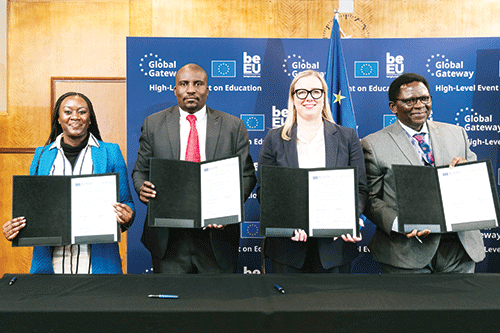Iuze Mukube
An initiative fund’s formal signing took place at the Global Gateway High-Level Education event recently in Belgium.
The agreement focuses on the Youth Mobility for Africa Flagship initiative that fosters learning mobility and skills within Africa and the European Union.
Kenneth Matengu, Vice Chancellor of the University of Namibia (Unam) and president of the Pan-African University Council signed the agreement.
Matengu said the goal of the programme is to enhance higher education’s role in Africa’s socioeconomic development and encourage brain circulation, and regional, continental and international cooperation by facilitating more mobility for faculty and students throughout African higher education systems.
He further noted that the initiative seeks to address the urgent need for highly-qualified professionals, as sought by Agenda 2063’s goal for
10 000 PhDs to be awarded each year.
Matengu expressed great satisfaction with the European Union’s commitment to supporting African states in their efforts to finance higher education. It is believed that the assistance will significantly and promptly advance learning and growth objectives.
“Through a variety of channels, the programme will greatly enhance intra-African mobility and skills development that include financing for new learning mobility initiatives that will improve green and digital skills-two things that are vital in today’s labour markets-for students, trainees and employees throughout the continent,” he said.
Additionally, through initiatives like the African Academic Qualifications Framework and the African Credit Transfer System, the strategy promotes the uniformity of educational standards and credentials throughout the continent of Africa.
Furthermore, African colleges will become more appealing and competitive because of these initiatives, supporting the continent’s larger economic and educational objectives.
He stated that even if the money might not immediately benefit every university, its purpose is to support the most creative and worthwhile programmes in order to create a major strategic impact.
As such, he urged academic institutions to improve their grant-writing skills in order to apply efficiently for these monies.
“The funds are allotted in a competitive manner through yearly calls for applications, from which the top 15 are funded in collaboration with European universities.
The flagship initiative programme is built on several existing and new EU-funded programmes of up to EUR 970 million (estimated N$19 billion), such as Erasmus+; the Intra-Africa Academic Mobility Scheme; the Harmonisation of African Higher Education Quality Assurance and Accreditation Initiative; the young African Leaders Programme; and the Africa-Europe Youth Academy.”
Mobility and skills development
for youth are achieved through
several structured programmes
under this initiative.
Universities are required to form consortiums that allow for student mobility for credit transfers or degree completion across African universities.
“In addition, the initiative complements existing frameworks aimed at creating seamless transitions for students across institutions on the continent. This is integral to building a robust academic network that supports the free exchange of ideas, resources and expertise, directly contributing to enhancing the skills and mobility of the youth,” he pointed out.
The initiative was launched to directly respond to the educational needs of African youth, aiming to enhance their employability and active citizenship in a global context.
Furthermore, Matengu stated
that the focus on skills and mobility reflects a strategic approach to foster a well-educated and highly-skilled workforce that can thrive in an increasingly digital and green economy, and effectively contribute to the continent’s sustainable development.
– mukubeiuze@gmail.com



